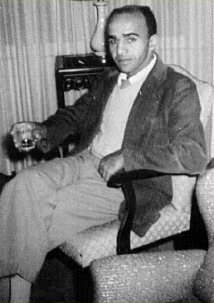born: April 24, 1919 in Centralia, Illinois.
Professor of statistics. More than 60 publications on Baysian statistics, probability, game theory, set theory, dynamic programming, and information theory. Industrial consultant. Member of the National Academy of Sciences. Past president of the American Statistical Society.
“I love pictures. Formulas and symbols — I don’t especially like them.”
“Basically, I’m not interested in doing research and I never have been. I’m interested in understanding, which is quite a different thing.”
“While being interviewed, he went to the board several times to ‘share something beautiful with somebody else.’ David Blackwell, the theoretician, is also a natural-born teacher.”
As a schoolboy, Blackwell did not care for algebra and trigonometry (“I could do it and I could see that it was useful, but it wasn’t really exciting.”) Geometry turned him on. “The most interesting thing I remember from calculus was Newton’s method for solving equations. That was the only thing in calculus I really liked. The rest of it looked like stuff that was useful for engineers in finding moments of inertia and volumes and such.” In his junior year he took an elementary analysis course and really fell in love with mathematics. “That’s the first time I knew that serious mathematics was for me. It became clear that it was not simply a few things that I liked. The whole subject was just beautiful.” Four years later he had a Ph.D..
The list of Black mathematicians is short and it doesn’t seem to be growing very rapidly. Blackwell thinks that many people are just more ambitious than he is. “Black people go in other directions. Black people are going into the professions: law, medicine, and business. I sort of understand that: there’s more security. There’s more certainty of having a fair income in those areas than there is in mathematics. [There are a number of examples of] Black people who have had considerable mathematical talent but went into law.”
While Blackwell was growing up, “Southern Illinois was probably fairly racist. But I was not even aware of these problems — I had no sense of being discriminated against.” At 16 he enrolled at the University of Illinois and expected to be an elementary school teacher. There were no Black faculty members on that campus. In 1943, after two years as a prestigious postdoctoral fellow of the Institute for Advanced Study, Princeton, he wrote 104 letters of application for university teaching jobs — all to Black colleges. “I just assumed that [the door] was closed.” He spent the next 10 years at Howard University, building a national reputation as a creative researcher and a talented teacher.
By the 1950’s the employment situation for Blacks had begun to change. “I feel that there must have been a big change just resulting from World War II.” In 1954 Blackwell accepted an invitation to join the faculty of the newly formed Department of Statistics (separate from the Department of Mathematics) at the University of California, Berkeley. He enjoys “being part of a smaller group…..where everybody talks to everybody else.” Although he has taken his turn chairing the department, he does not miss the administrative role. “When I gave up being chairman, for about a year my first waking thought was, ‘I’m no longer chairman,’ and it made my day.”
Blackwell teaches every term — from very elementary courses to graduate level seminars. “There is beauty at all levels of sophistication and all levels of abstraction.” What else does he do during a typical day? “Well, [today I tried] to understand two forms of the category 0-1 law (a probabilistic meta-theorem). That’s at a rather high abstract level. [I was also] trying out programs for minimizing a function of five variables, looking at curves and trying various techniques. The first thing is a somewhat more serious activity; the other is unlikely to result in anything more than my better understanding the problem of minimizing functions. I play quite a bit.”
Blackwell has seen revolutionary changes in campus dynamics while he’s been at Berkeley. He actively supported the free speech movement of the 1960’s. For example, “No [Presidential] candidates were allowed to speak on the Berkeley campus. The administration [held that] The University must not get involved in political matters. [The students] wanted to hear all kinds of ideas discussed on the campus. The administration simply wouldn’t move an inch. I did not like the way the students expressed their grievances, but they really had something to protest!”
Blackwell and his wife have raised eight children. None of them have any particular mathematical interests. The Blackwells bought a 40-acre retreat in northern California, complete with a creek and big redwoods. “My dream was to go up on weekends, get a martini, sit under a redwood tree, and watch the creek go by. [Instead] I work from the time I get there until I leave, planting trees, repairing fences cutting weeds, fixing a leak in the barn.” Things have not worked out the way the would-be grade school teacher from the rural Midwest thought they would. “But it is a lot of fun.”
Condensed by Larry Curnutt from Mathematical People: Profiles and Interviews by Albers & Alexanderson (Birkhauser, 1985).
Last Updated September 21, 2022

